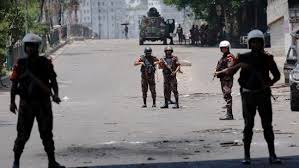DHAKA: The Sheikh Hasina government late on Friday announced a nationwide curfew across Bangladesh and ordered the deployment of military forces to maintain law and order following days of deadly clashes over the allocation of government jobs.
The announcement was made by Obaidul Quader, general secretary of the ruling Awami League Party, and came after police and security officials fired on protesters on Friday and banned all gatherings in the capital. Several people were killed, media reports said.
Quader said the military was deployed to help the civilian administration keep order.
Three people were killed on Friday as the police cracked down on unrelenting student-led protests against government job quotas despite a ban on public gatherings, local media said.
Police fired tear gas to scatter protesters in some areas, an eyewitness said. He said he could see many fires across Dhaka from a rooftop and smoke rising into the sky in several places.
Telecommunications were also disrupted and television news channels went off the air. Authorities had cut some mobile telephone services the previous day to try quell the unrest. Bengali newspaper Prothom Alo reported train services had been suspended nationwide as protesters blocked roads and threw bricks at security officials.
Three people were killed on Friday, it said, after violence on Thursday in 47 of Bangladesh’s 64 districts killed 27 and injured 1,500. Reuters could not immediately verify the reports and police have not issued a casualty toll.
The protests initially broke out over student anger against controversial quotas which set aside 30 per cent of government jobs for the families of those who fought for independence from Pakistan.
The nationwide unrest — the biggest since Prime Minister Sheikh Hasina was re-elected this year — has also been fuelled by high unemployment among young people, who make up nearly a fifth of a population of 170 million.
Some analysts say the violence is now also being driven by wider economic woes, such as high inflation and shrinking reserves of foreign exchange.
The protests have opened old and sensitive political faultlines between those who fought for Bangladesh’s independence from Pakistan in 1971 and those accused of collaborating with Islamabad.


